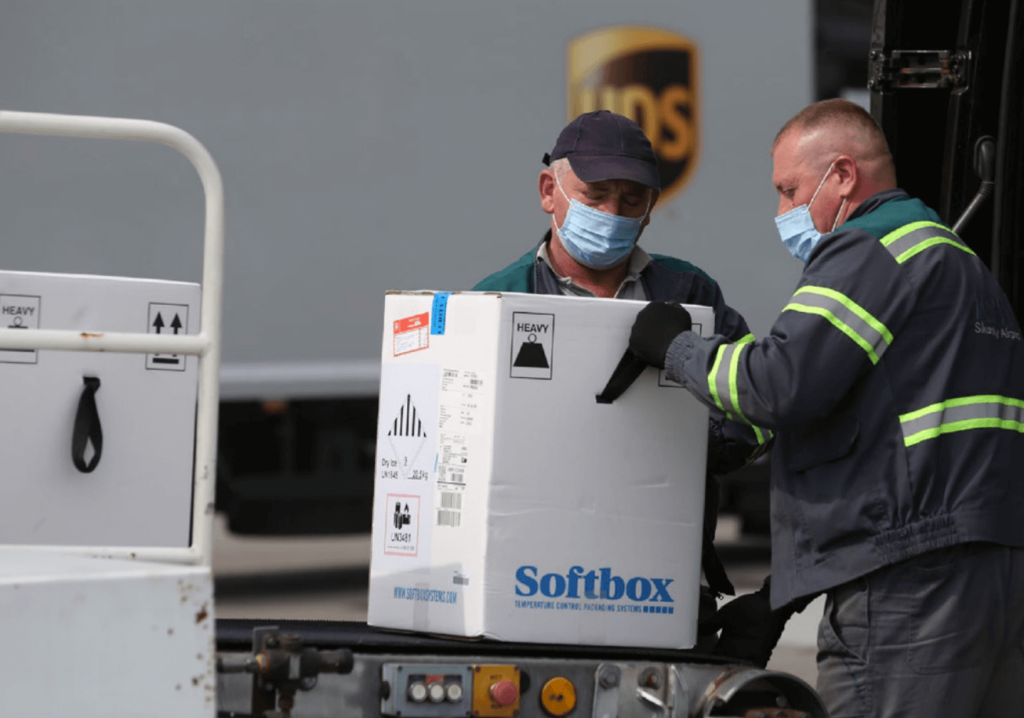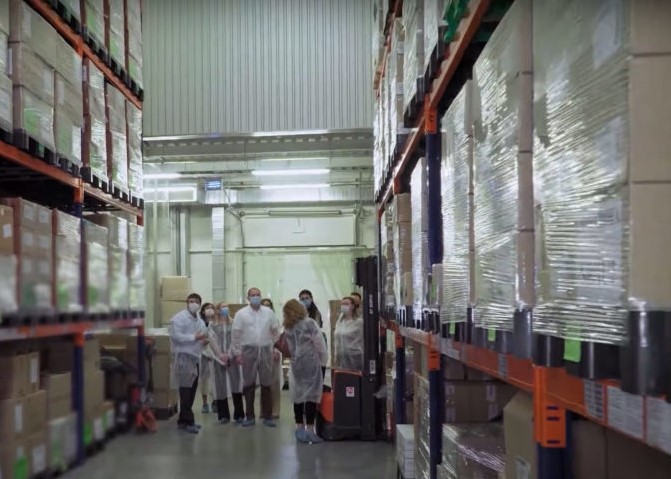Ukraine’s Investments in Digitizing its Health Supply Chain Are Saving Lives during the War
Ukraine’s Investments in Digitizing its Health Supply Chain Are Saving Lives during the War
By Jennifer Gardella

When Russia invaded Ukraine on February 24, 2022, the country’s health system was not spared from the devastating effects of the war. Critical health infrastructure—from manufacturing sites to hospitals—was among the first to be immobilized or destroyed by bombings. Constant shelling, damaged roads, and closed airports prevented the government and its logistics partners from delivering essential medicines and medical supplies to much of the country, leaving pharmacies unable to dispense these items. The infrastructural breakdown of hospitals and clinics meant people struggled to receive the care they needed.
Despite the catastrophic challenges over the last year, a decade of strong investments by the government to bolster and digitize its health system left Ukraine well-prepared to rapidly adapt and respond to emerging and evolving wartime needs. Amid ongoing conflict, the country continues to implement and expand key health sector functions and interoperable systems to effectively meet the needs of its people.
MPU: Keeping Ukraine’s Health Supply Chain Intact during the War
Long before the war began, the Government of Ukraine had already set its sights on combatting pervasive inefficiencies and challenges affecting the country’s health sector. Over the last 15 years, Management Sciences for Health (MSH) has served as a trusted partner to strengthen the governance and management of the country’s pharmaceutical systems, enhance transparency, and advance policies that improve access to safe and affordable medicines for all Ukrainians. When the war broke out, MSH—through the USAID Safe, Affordable, and Effective Medicines for Ukrainians (SAFEMed) activity, which began in 2017—quickly pivoted and scaled operations to support the country’s supply chain management and logistics as health needs evolved.

A key component of these efforts was supporting the Ministry of Health (MOH) and its state agency, the Medical Procurement of Ukraine (MPU)—a centralized entity created in 2018 to assume responsibility for procuring all medicines and medical supplies on behalf of MOH—to overcome various wartime constraints. Over time, MPU had solidified itself as the backbone of the country’s health supply chain, procuring essential medicines on behalf of the government with faster delivery times and an annual savings to the state budget; for example, in 2021, the year prior to the war, that savings amounted to more than $43 million. They continue to achieve impressive savings, despite the war. Since Russia’s invasion, SAFEMed has supported MOH and its agencies, such as MPU, in the ongoing development and implementation of transparent, effective, and sustainable processes to keep the country’s health supply chain afloat.
By providing funding for software licenses, internet servers, cyber security protections, and embedded IT experts, SAFEMed has helped keep MPU’s digital infrastructure online despite widespread disruptions in connectivity due to the war. SAFEMed has also helped MPU adapt its existing digital systems—and develop new ones—to cope with the rapidly evolving wartime situation, from managing emergency procurements of urgently needed pharmaceutical supplies to quickly developing new IT functionality to track and monitor high-volume distributions of humanitarian medical aid.
MedData: Ukraine’s Wartime Digital Lifeline
Launched with SAFEMed’s support in 2018, MPU’s MedData platform provides real-time information and visibility into the country’s health supply chain, allowing Ukraine to track medicines and medical supplies from the warehouse to the hospital and, ultimately, to the patients who need them the most, a capability that has proven invaluable over the last year of war. Despite the immense challenges posed by the conflict, the number of health facilities reporting on stock levels through MedData has grown exponentially over time, increasing from just 300 facilities in 2021 to more than 4,000 by the end of 2022. MOH, together with SAFEMed coordination, were able to rely on MPU and other data systems to distribute more than 11,000 tons of supplies worth around $461 million to health care facilities throughout all regions of the country.
In addition to medicines and medical supplies, SAFEMed helped MPU adapt MedData to track another essential, lifesaving commodity: blood. “When the war started, we didn’t have a real understanding of what was going on with the blood supply,” explains Roman Lanskyi, Senior Digital Health Advisor for SAFEMed. “You’re in a war. Blood is probably one of the most important things. But in Ukraine, we didn’t have any IT or digital tools for the blood centers.”
This lack of visibility into the nation’s blood supply posed major challenges for the health system to respond to heightened demand for blood in hospitals. “In regions experiencing heavy fighting, you have a situation where civilians are sustaining traumatic injuries and are in dire need of blood donations. So, it was very important for the Ukrainian government to understand what was going on, how much blood we had, where it was, and where it needed to go to save lives.”
In recognition of this urgent need, SAFEMed helped MPU adapt MedData to integrate information from blood centers and hospitals on the front lines to inform distribution of blood donations to the areas hardest hit by the war with the most acute needs. “With our support, MPU developed and implemented this brand-new functionality—integrated within the existing MedData system—in less than two weeks.”

Launching New Platforms to Expand Ukraine’s Digital Health Ecosystem
During the most volatile months of the war, SAFEMed not only helped MPU adapt its existing systems but also helped launch the development of two new digital platforms designed to further automate supply chain functions and better integrate with other existing health information systems: eStock and MedSupply. Currently in its initial development phase, eStock—managed by MPU and linked directly to health facility information systems—aims to serve as the national logistics management system that will monitor and maintain adequate health facility-level stock levels of all centrally procured medicines and medical devices. “Once it is fully launched, eStock will support the full procurement and supply chain management cycle and coordination of drug and medical device stock balances and replenishment processes at the national level, which is a really important achievement for the country—especially during wartime,” explains Liudmyla Shemchuk, SAFEMED’s Senior Technical Advisor for Procurement.
MedSupply, on the other hand, aims to enhance functionality of MPU’s internal systems that support logistics management. Powered by information obtained from MedData and eStock, MedSupply will enable MPU to forecast and replenish central inventory levels and keep up with regional demands, improve delivery times, minimize storage costs, and reduce errors from manual stock management.
Together, these three digital systems significantly increase transparency and enhance MPU’s work and facilitate integration with the health ministry, as well as health care facilities, suppliers, and logistics partners nationwide. “Each [of these systems] plays an essential role in achieving maximum efficiency and improving the experience of patients,” says Alona Zhuzha, MPU Deputy General Manager for IT. “The important thing is that [the systems] do not duplicate but complement and enhance each other, creating a single holistic ecosystem of the national medical digital infrastructure.”
The Importance of Building Resilient Health Systems
The Ukrainian government’s strong investments in building robust yet flexible digital tools long before the war began have been critical to its health sector’s success in adapting quickly despite the immense and ongoing challenges posed by the invasion. “When the whole country was shaken by the invasion—people fearing for their lives and migrating from one place to another to escape the conflict— the nation was very lucky to already have an agency like MPU with these capabilities,” Shemchuk reflects. “They [MPU] were still able to meet the demand and provide the population with essential items, because they had these digital systems in place already.”
MPU’s ability to rapidly pivot to meet urgent wartime demands is reflective of the resilience of Ukraine, its institutions, and its people, clearly demonstrating how the investments made in health systems today can pay dividends tomorrow, especially in times of crisis.